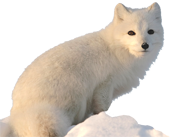Introduction
Research Priorities
The NWMB’s desire to establish wildlife management and research priorities is guided by the relevant principles of the Nunavut Agreement. There is a need to ensure that Nunavut’s wildlife resources are being managed properly, according to the principles of conservation (S 5.1.5) and for the benefit of Nunavut residents.
The NWMB has developed its own set of Wildlife Research and Management Priorities as they relate to the Board’s duties and functions set out in the Nunavut Agreement.
In addition to establishing its own priorities, the NWMB holds “Regional Wildlife Research and Management Priority Workshops” every three years in each of the three regions of Nunavut: Qikiqtaaluk (Baffin), Kivalliq, and Kitikmeot. Representatives from each of the communities participate in the 2-day workshops to hear about and discuss current local and regional issues in wildlife management and work together to develop a list of Regional Wildlife Research and Management Priorities.
Establishing priorities assists the NWMB and other agencies in setting management work plans for the coming year(s), and assists the NWMB and other agencies in determining funding allocations to address priority issues. NWMB specifically uses these priorities when evaluating applications for funding for the Nunavut Wildlife Research Trust (NWRT) and Nunavut Wildlife Studies Fund (NWSF)
For recent lists of Regional Wildlife Research and Management Priorities, click the links below:
- 2023-2025 Qikiqtaaluk (Baffin) Priorities
- 2023-2025 Kivalliq Priorities
- 2023-2025 Kitikmeot Priorities
- 2023-2025 NWMB Priorities
 Priorities
Priorities
Funding - Introduction
The Nunavut Agreement puts research squarely at the heart of an effective wildlife management system. Research is needed to provide information to the NWMB and its co-management partners to ensure that the best possible information is made available for making decision concerning Nunavut’s wildlife.
Article 5.2.37 of the Nunavut Agreement states that "there is a need for an effective system of wildlife management, and to be effective, the system of management requires an efficient, coordinated research effort".
Research is necessary to ensure that wildlife resources are harvested in a knowledgeable and sustainable way so that Nunavummiut can continue the hunting and fishing that is so essential to their way of life. The NWMB has a lead role to play in this area and is committed to making wildlife research responsive to the needs and concerns of the people of Nunavut.
To achieve these goals, the federal government set aside an $11 million trust fund upon the signing of the Nunavut Agreement to fund wildlife research. The Nunavut Wildlife Research Trust funds research projects undertaken by government agencies. In addition, the NWMB funds projects undertaken by non-government organizations (such as Hunters and Trappers Organizations) through the Nunavut Wildlife Studies Fund.
In the new North – where co-management bodies such as the NWMB determine the course of resource management – wildlife-related research is no longer done strictly by southern scientists without the input of knowledgeable Inuit. Today, Inuit help decide what research needs to be done, how research should be done, and they are involved in doing the research. Many Inuit are wildlife experts, and their knowledge and experience must be part of the research process.


